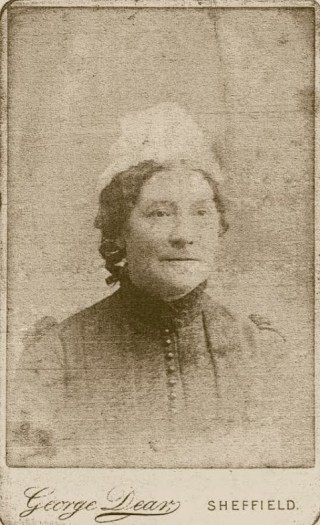Eliza Stainton, The Altruist of Broomhall
Sheffield Daily Telegraph, August 1875
Research & Transcript by Niv Chhabria
Eliza Stainton, wife of the late Rev. Robert Stainton lived on 95 Broomspring lane for most of her life. She was committed to philanthropic work and the upliftment of women in Sheffield as a keen member of the Sheffield Women’s society.
The Sheffield Women’s society objective was to abolish the distress and atrocities confronted by women and worked on the enhancement of their skills by conducting large classes. Eliza was a great help meet, and for over 30 years worked unsparingly on behalf the poor. During this period at Garden Street and Mount Zion she conducted large classes for women, and a very real attachment existed between teacher and class. A key campaign undertaken by the women’s society was to bring about a change in the reduction of issuance of licenses to houses selling intoxicating drinks to reduce drunkenness and as a consequence reduce poverty and crime. The transcribed article below throws light on this movement,
Petitions From The Women Of Sheffield
A deputation consisting of Messrs. G. Doncaster, H. J. Wilson, D. T. Ingbam, S. Hoyland, G. W. Sharman, and O. J. Whitehead attended before the Bench to present petitions.
Mr. C. Doncaster said he had to present a petition from the women of Sheffield. It was very short one, and was as follows :— “We, the undersigned women of being deeply impressed with the incalculable evils which result from the common use of intoxicating liquors, respectfully urge upon your worships to grant no new licenses, and as far as possible to diminish the number at present existing.” This petition was signed by 1352 women. He thought he might say very little effort had been used in getting these signatures and that a large number might have been got if it had been desired. It would be known to the Bench that perhaps the women and the children were the greatest sufferers from the drunken habits of the men. He thought, indeed he trusted, that this petition would have due weight in strengthening the bands of the Bench in refusing to grant further licences. He believed that really there could not honestly two opinions that the facilities for obtaining intoxicating liquors were in excess of what was necessary, and be trusted the memorial would have its full weight with the Bench in proceeding to the business of Brewster Sessions.
The Rev. Walter Lenwood supported the petition, and said he had another to present from the Sheffield Women’s Society for the Suppression of Intemperance, and signed by every member of the Committee of that Society. The petition read as follows:- To the Licensing Magistrates of the Borough of Sheffield.— Gentlemen,—We, the undersigned members of the Committee of the Sheffield Women’s Society for the Suppression of Intemperance, desire earnestly to appeal to you to use the great powers that the law confers upon you to lessen the temptations to drunkenness that abound in our large town. We are convinced that a reduction in the number of houses for the sale intoxicating drink would materially lessen the amount of drunkenness, and as a consequence diminish poverty and crime. To bring about these desirable ends we beg you to grant no new licenses, and to withdraw such old ones as by the misconduct of their holders have been justly forfeited.—Mary A. Rawson, Mary M. Barber, Eliza H. Stainton, Mary B. Hopkins, Emily Read, A. Emmeline Chorlton, Charlotte Lenwood, Hannah Mary Doncaster, Anne Hoskin, Anna Mary Yeomans, Mary Calvert, Sarah Ruth Wilson, Annie Douglas, Caroline Barber, Hannah Maria Eeroyd, Harriette Pye Smith, Caroline Whalley, MariaD.[Doncaster.” The women of Sheffield had been encouraged this their course by the fact that the judges of the land had in their recent charges attributed the overwhelming majority of the crimes of violence to the influence of intoxicating drink. They therefore begged that the Bench would have some deference to these authorities, and not increase the number of public-houses, but as far as possible lessen them. They hoped the magistrates would not favour that which the judges so strongly condemned, and the Committee expressed an opinion that there were already more houses of this kind than the public convenience required. Might he also draw their worships’ attention to the novelty of these petitions? It was very rarely that women came forward to address them in this manner—they had never done so in Sheffield before. They, however, pointed to the wide-spread and intolerable evils of the present system, and asked the magistrates to lessen the number of public houses as far as lay in their power. The petitioners were of that sex the members of which, although the silent, were often the keenest sufferers from the effects of drunkenness, some of them were women who knew the effects in their own homes of drink and on their families, and they pleaded with the Bench to lessen the number of these public houses—many of them, he could assure the Bench, had signed this memorial with a terrible emphasis. Amongst the memorialists appeared the names of respectable ladies in Sheffield, who, by visiting the homes of many of the poor sufferers, had heard such tales heartrending sorrow that they thought they could not better help the cause of those suffering than by appealing to the Bench to lessen these sources of sin and sorrow. He thought their worships would receive the petition with unusual respect. It was signed by 1,300 women, and these were but samples of the very many who would gladly have signed it had facilities been put in their way to do so. Mothers appealed them not to add to but if possible to restrict these places of temptation wherein so many of their beloved children were led into the paths of sin and sorrow. They appealed to the Bench men, to the chivalry of their soul, to their gentler nature, believing that the defenceless would not appeal to them in vain.
The Stipendiary said the magistrates had heard what had been said in support of these memorials. Their duty was to hear each applicant patiently, and to make their minds at the end of the application. At the same time the Bench must say that they were impressed with the necessity of using and exercising great caution in granting new licenses. Further than that the Bench did not wish to say anything.










No Comments
Add a comment about this page